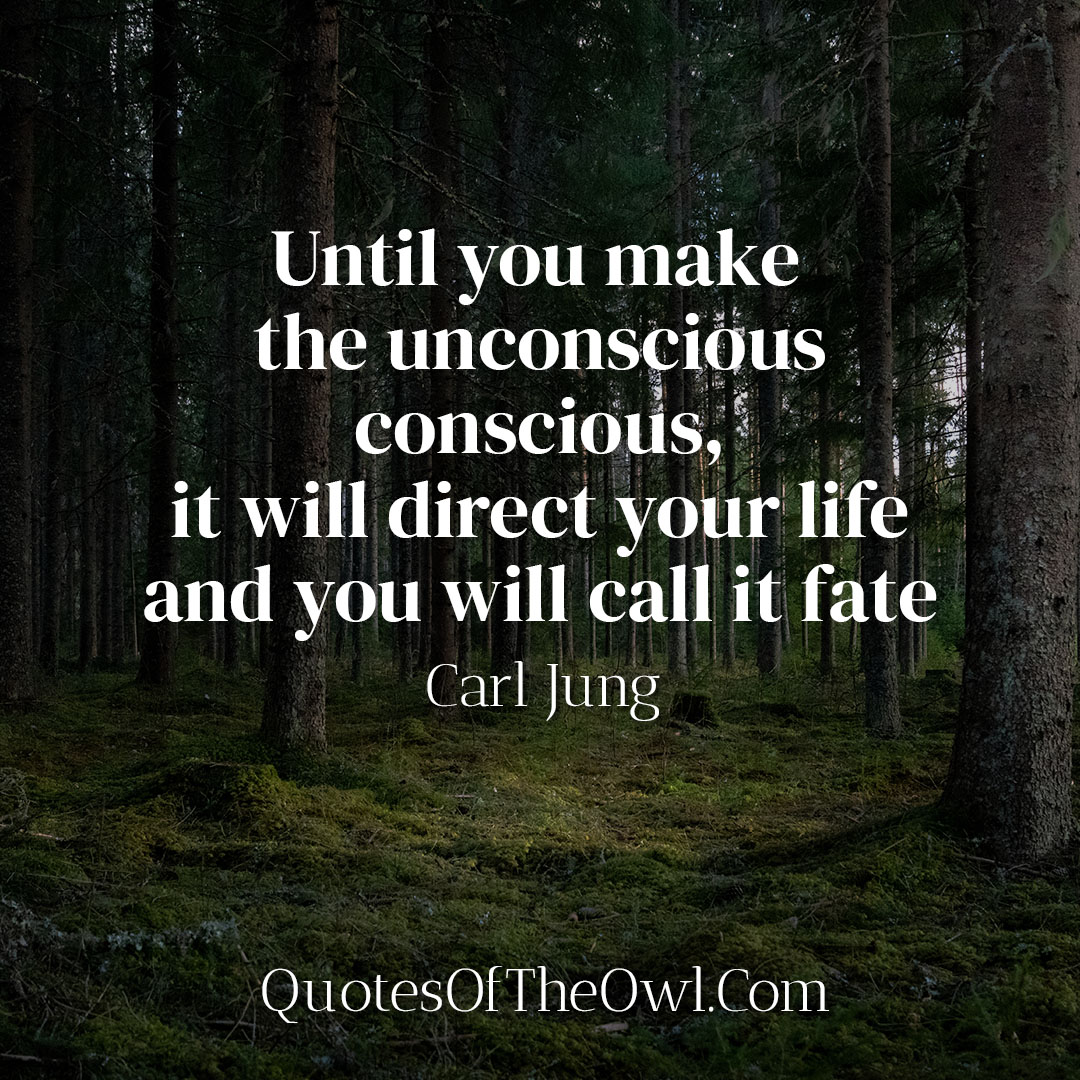Until you make the unconscious conscious, it will direct your life and you will call it fate – Carl Jung’s Quote Meaning
Carl Jung, a renowned Swiss psychiatrist and psychoanalyst, once said, “Until you make the unconscious conscious, it will direct your life and you will call it fate.” This thought-provoking quote encapsulates the profound influence of the unconscious mind on our lives. In this article, we will delve into the meaning behind Jung’s words and explore the significance of self-awareness in our personal growth and development.
Understanding the Unconscious Mind
The unconscious mind, as proposed by Carl Jung, refers to the vast reservoir of thoughts, emotions, and memories that lie beneath our conscious awareness. While we may not be directly aware of its workings, the unconscious mind plays a pivotal role in shaping our thoughts, feelings, and behaviors. It stores information, experiences, and beliefs that have been repressed or forgotten, yet continue to exert a powerful influence on our lives.
Exploring Carl Jung’s Quote
Jung’s quote emphasizes the transformative power of bringing the unconscious into consciousness. It suggests that until we become aware of the hidden forces within us, we remain at the mercy of our unconscious patterns, unaware of their impact on our lives. We often attribute the outcomes of our actions to external circumstances or fate, without realizing that our choices and behaviors are deeply rooted in the unconscious.
Unconscious Patterns and Behavior
Unconscious patterns play a significant role in shaping our behavior and decision-making processes. Habits, beliefs, and conditioning acquired throughout our lives are often stored in the unconscious mind. These patterns, when left unexamined, can create limitations and repetitive cycles that hinder our personal growth and fulfillment. By making the unconscious conscious, we gain the power to identify and transform these patterns, freeing ourselves from their grip.
Self-Reflection and Self-Awareness
Self-reflection is a fundamental practice in the journey of self-awareness. It involves consciously observing and examining our thoughts, emotions, and behaviors. Through self-reflection, we can unveil the hidden aspects of our unconscious, bringing them into the light of conscious awareness. By developing the habit of self-reflection, we gain insights into our motivations, fears, and desires, enabling us to make more conscious choices.
Overcoming Limiting Beliefs and Patterns
One of the crucial aspects of making the unconscious conscious is identifying and challenging limiting beliefs. These beliefs, often formed early in life, can shape our perception of ourselves and the world around us. By consciously questioning these beliefs and examining their validity, we open ourselves up to new possibilities and create space for personal growth. Breaking free from unconscious patterns requires courage, introspection, and a willingness to step outside our comfort zones.
Empowering Personal Growth
Becoming conscious of the unconscious is a transformative journey that leads to personal growth and self-empowerment. As we develop self-awareness, we gain a deeper understanding of our true selves, our strengths, and our weaknesses. This awareness enables us to align our actions with our values, make conscious choices, and create a more fulfilling and authentic life. It empowers us to take charge of our destiny instead of being governed by unconscious forces.
Integrating Carl Jung’s Quote in Daily Life
To integrate the wisdom of Carl Jung’s quote into our daily lives, we must cultivate self-awareness through various practices. Regular self-reflection, journaling, mindfulness, and therapy are some effective tools to explore the unconscious and bring it into consciousness. By observing our thoughts, emotions, and reactions, we can unveil unconscious patterns and consciously choose a different course of action. It is through this process that we can reshape our lives and live more authentically.
The Power of Choice and Responsibility
Jung’s quote reminds us of the power we hold in our choices and the responsibility to be conscious of them. When we recognize that our lives are not solely determined by external factors, but rather shaped by our conscious and unconscious choices, we reclaim our agency. By taking responsibility for our thoughts, actions, and emotions, we become active participants in shaping our destiny, rather than passive victims of fate.
Conclusion
In conclusion, Carl Jung’s quote is a powerful reminder of two things: the significance of self-awareness and the role of the unconscious mind in our lives. When we bring the unconscious to the forefront of our consciousness, we gain the power to comprehend and alter hidden patterns. This process leads to personal growth and empowerment. As we begin the voyage of self-reflection and self-discovery, we uncover the concealed influences that shape our existence. This, in turn, enables us to make conscious choices and live authentically, opening up new possibilities.

